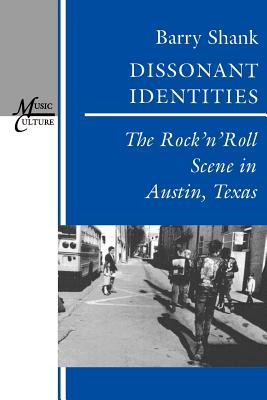
- We will send in 10–14 business days.
- Author: Barry Shank
- Publisher: Wesleyan University Press
- ISBN-10: 0819562769
- ISBN-13: 9780819562760
- Format: 15.4 x 22.9 x 2.4 cm, minkšti viršeliai
- Language: English
- SAVE -10% with code: EXTRA
Reviews
Description
A fascinating analysis of the music scene in Austin, Texas.Music of the bars and clubs of Austin, Texas has long been recognized as defining one of a dozen or more musical "scenes" across the country. In Dissonant Identities, Barry Shank, himself a musician who played and lived in the Texas capital, studies the history of its popular music, its cultural and economic context, and also the broader ramifications of that music as a signifying practice capable of transforming identities.
While his focus is primarily on progressive country and rock, Shank also writes about traditional country, blues, rock, disco, ethnic, and folk musics. Using empirical detail and an expansive theoretical framework, he shows how Austin became the site for "a productive contestation between two forces: the fierce desire to remake oneself through musical practice, and the equally powerful struggle to affirm the value of that practice in the complexly structured late-capitalist marketplace."
EXTRA 10 % discount with code: EXTRA
The promotion ends in 21d.09:15:16
The discount code is valid when purchasing from 10 €. Discounts do not stack.
- Author: Barry Shank
- Publisher: Wesleyan University Press
- ISBN-10: 0819562769
- ISBN-13: 9780819562760
- Format: 15.4 x 22.9 x 2.4 cm, minkšti viršeliai
- Language: English English
Music of the bars and clubs of Austin, Texas has long been recognized as defining one of a dozen or more musical "scenes" across the country. In Dissonant Identities, Barry Shank, himself a musician who played and lived in the Texas capital, studies the history of its popular music, its cultural and economic context, and also the broader ramifications of that music as a signifying practice capable of transforming identities.
While his focus is primarily on progressive country and rock, Shank also writes about traditional country, blues, rock, disco, ethnic, and folk musics. Using empirical detail and an expansive theoretical framework, he shows how Austin became the site for "a productive contestation between two forces: the fierce desire to remake oneself through musical practice, and the equally powerful struggle to affirm the value of that practice in the complexly structured late-capitalist marketplace."


Reviews